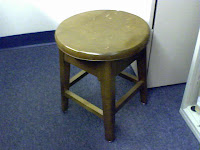My German Teacher
"Whatsoever thy hand is able to do, do it earnestly." (Ecclesiastes 9:10)
We worked hard in my high school German class. Our instructor was Father Richard Cleary, an Oblate of St. Francis de Sales and an unusually effective teacher. I still marvel at how he got forty 15-year-olds to sit through it all: conversational drills, reading exercises, and homework every night. Fr. Cleary's little discourses on German life and culture we counted as small respite. Yet he was able to get even the most rambunctious students to cooperate. In the three years I had him as a teacher, I saw him give detention exactly once, and it broke his heart to do so. He gave us his best, and we felt we could do nothing less in return. His encouraging smile even got us very cool adolescent boys to sing "O Tannenbaum" and "Stille Nacht" every Christmas.
Not long ago I met up with Fr. Cleary again, more than twenty years later. [Note: Fr. Cleary has since died, in 2009.] He's working in an inner-city parish, gracious as ever. I brought him a bottle of Eiswein, the special wine of the Rhine region made from grapes frozen on the vine. We talked about his teaching days. I asked him if he had kept his knowledge of German sharp. Had he a flair for languages? Had he lived or traveled in Europe, perhaps? "Oh, that," he smiled. "When I reported to the high school, they said they needed a German teacher. I had had some German in college, so I got the textbook out and started studying. I managed to stay a couple of chapters ahead of you guys." He had, in fact, spent most of his priestly career as a spiritual director.
Did I feel cheated that my beloved teacher was not a German scholar? Far from it! He had impressed many things on my young mind: the necessity of order, of patient effort, of respect for others. To work hard and joyfully at what needs to be done-- I can't think of a better expression of the message of Christ. And I wish I had more of Fr. Cleary's spirit of service, without which the word of God would wither and die among men. I learned all that, and-- oh, yes, a lot of German, too.








